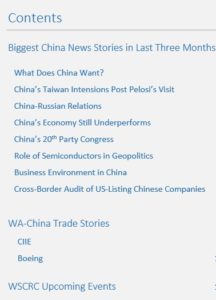On March 7, Monica Hardy Whaley, President of the National Center for APEC (NCAPEC), provided a highly informative and insightful discussion on the U.S. hosting of APEC this year including a large number of meetings in Seattle. Thirty years ago in 1993, Seattle hosted the first-ever APEC Leaders’ Summit on Blake Island. Washington State and Seattle has long been at the center of U.S. engagement with the Asia-Pacific region
Monica explained that from July 29 to August 21, Seattle will host the third Senior Officials’ meetings as well as several Ministerial-level sessions. The Seattle meetings will focus on women’s empowerment, health, energy, food security, disaster management and small and medium-sized enterprises (SMEs). All the meetings will be coupled with a theme of “digital month” in Seattle as each one of them will have a digital angle. Stacy Jehlik, Director of International Affairs at the City of Seattle, was also invited to speak about how to get involved in APEC events in Seattle. She encouraged interested businesses, organizations, and individuals to contact her (click on her name above) for opportunities such as becoming a volunteer or a sponsor.
Exact dates for the meetings have not been confirmed yet. But a calendar for the APEC meetings in the U.S. this year provides a rough timeline of all the meetings. People can also contact Monica Whaley to stay updated with the APEC agenda.
For more information about the U.S. hosting of APEC this year, please visit the NCAPEC’s website, including on the APEC CEO Summit, a FAQ page about 2023 APEC, and NCAPEC’s blog.
Click here to rewatch the webinar.
 uarter, the tensions between U.S. and China shows no sign of easing, especially after House Speaker Nancy Pelosi’s Taiwan visit. Despite the harsh environment, the Council—in cooperation with its educational arm, the Washington State China Relations Fund—continues to produce programs in an effort to present a more nuanced picture of the U.S.-China relationship. In this report, we analyzed some of the big news in the U.S.-China relationship since in the last three months. We also provided an update on the WA-China trade interactions, including the China International Import Expo and Boeing’s strategy with the Chinese market.
uarter, the tensions between U.S. and China shows no sign of easing, especially after House Speaker Nancy Pelosi’s Taiwan visit. Despite the harsh environment, the Council—in cooperation with its educational arm, the Washington State China Relations Fund—continues to produce programs in an effort to present a more nuanced picture of the U.S.-China relationship. In this report, we analyzed some of the big news in the U.S.-China relationship since in the last three months. We also provided an update on the WA-China trade interactions, including the China International Import Expo and Boeing’s strategy with the Chinese market.